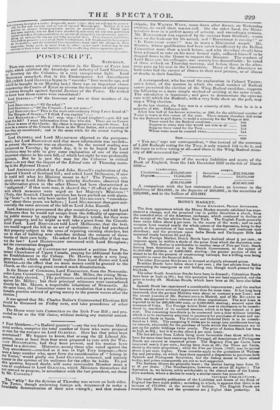POSTSCRI PT.
SATURDAY.
There was some amusing conversation in the House of Peers last night, which exhibited the hnowledyc and industry of Lord GLENELG, as Secretary for the Colonies, in a very conspicuous light. Lord BROUGHAM remarked, that in the Ernancipatitn Act Amendment gill, (which Lord GLENELG began to " consider " four months ago, and which he brought in on Monday last,) there was an important clause empowering the Courts of Error to reverse the decisions of other courts in actions brought against Special Justices of the Peace. lie wished to know how those courts were constituted ? Lord GceszLo—" Of the Governor and two or three members of the
Council."
Lord BROCCHAM—" Of the what 9" Lord GLENELC—" Of the Council—I ant not sure—" Lord BROUGHAM--" This is the most extraordinary thing I ever heard of." The Marquis of Scloo—" I think I can explain"— Lord BROUGHAM—" Ha, ha! stop, stop—(Loud laughter)—you did not draw the bill ? I want information from him who dial. There are no Courts of Error in some of the islands : the clause is inoperative as iegards those. Let there be a return of the Courts of Error in the West Indies, and a statement of how they are constituted ; and in the mean while let the second reading be pmtponed." Lord GI.ENELG and Lord MErmottaNe objected to the postpone- ment; but Lord BROUGHAM said that more information was needed— at present the measure was an abortion. So the second reading was postponed to Tuesday ; by which day, it is to be hoped that Lord GLENELG may be able to give some explanation of one of the most important clauses in his own bill, of which last night he was profoundly ignorant. But he is just the man for the Colonies in critical times!—is not that the import of the Liberal vote of Thursday morn- ing in the Reformed House? Lord ABERDEEN alluded to Lord John Russell's explanation of the proposed Church of Scotland bill; and asked Lord Melbourne, if now he could tell what his Ministry meant to do ? The Premier, evi. dently sore at Lord John Russr.11's unlucky disclosure, observed that the information given in the other House had been characterized as "undigested:" if that were true, it showed the " ill effect of the haste with which measures were urged on her Majesty's Ministers !" [Truly, this Scottish Church question has been pushed on with alarm- ing " haste"—it has only been under Lord Al F.I.BOU RNE'S " considera- tion" about three years, we believe.) Lord MELBOURNE then gave sub- stantially the same account of the bill as Lord John Russell. Lord ABERDEEN pronounced the plan unsatisfactory ; and told Lord Melbourne that he would not escape from the difficulty of appropriat- ing public money by applying to the Bishop's teinds, for they were public property, and he might as well take a grant from the Consoli- dated Fund. Lord BROUGHAM told Lord Melbourne, that the heti- tors would regard the bill as an act of spoliation : they had purchased
their property subject to the onus of repairing existing churches, but not to that of building new churches without the consent of three-
fourths of their own body. Ile asked the Lord Chancellor if that was not the law? Lord HADDINGTON concurred with Lord Brougham; And the conversation dropped.
The Archbishop of CANTERBURY presented a petition from Pro- testant Churchmen of Upper Canada, praying for additional funds for the Establishment in the Colony. Dr. Howley made a very long, prosy speech ; which called forth replies from Lord Rirois and Lord GLENELG—to the effect that no more money could be granted to the Church, as the existing grant created much dissatisfaction.
In the House of Commons, Lord EBRINGTON, from the Newcastle- under.Lyne Committee, reported that Mr. Miller, the sitting Mem-
ber, was duly elected. [The petitioners endeavoured to prove bribery against Mr. Miller; but their principal witnesses were contradicted directly by Mr. Mason, a respectable inhabitant of Newcastle. At the same time, the Committee came to a resolution that a most objec- tionable practice existed of giving money to the poorer voters after the election.] It was agreed that Mr. Charles Buller's Controverted Elections Bill should be discussed on Friday next, and take precedence of other business.
The House went into Committee on the Irish Poor Bill ; and pro- ceeded as far as the 63d clause, without making any material amend- ments.


























 Previous page
Previous page